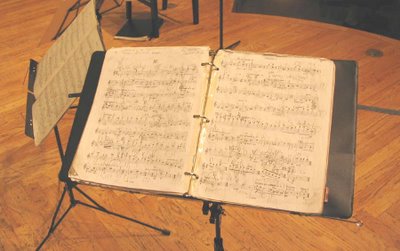Takács Quartet, Corcoran Gallery
Takács Quartet at the National Gallery (October 26, 2005) Takács Marathon, Part II (October 17, 2005) Takács Addiction (October 4, 2005) Where's My Takács? (March 10, 2005) Amazing Audial Alliteration: Borodin, Bartók, Beethoven (October 17, 2004) Dip Your Ears, No. 8: Béla Bartók, The Six String Quartets, Takács Quartet (August 5, 2004) |
The Takács played Mozart's "Dissonance" quartet at Shriver Hall, and it would have been nice to have heard that performance for comparison to the opening of this concert. Ionarts heard part of the Shriver Hall concert, but not the Mozart. K. 465 got its nickname from the strange slow introduction to its first movement, and players often exaggerate the dissonances to get the point across. This struck me as the calmest, smoothest rendition possible, from a group whose particular specialty has been Bartók. A different approach can make even the most jarring dissonant combinations of notes not jarring at all. In the Allegro portion of the movement, the tempo was plagued with minor inconsistencies, seeming to slow at points, only to be hastened along again by other players. The slow movement was achingly beautiful, and the minor mode trio was fraught with agitation. The concluding Allegro molto was thrillingly fast and self-assured in the handling of the Haydnesque stops and starts. This piece was a good start, with a few rocky moments at the opening.
 Musicians can be finicky about their scores. I know some who prefer to work always with clean scores, to allow them to develop a new interpretation each time. However, most of us keep the same scores from the first time we played the piece, with the pencil marks (never mark in pen!) our teacher scribbled on every page. What do you think the score of Bartók's second string quartet, owned by the first violinist of the Takács Quartet, would look like? (Yes, I wanted to know, too. The page -- torn out of its binding, dogeared, and heavily marked -- was open to the third movement.) I saw Geraldine Walther's score, too, and it is now happily filled with cues referring to her new colleagues.
Musicians can be finicky about their scores. I know some who prefer to work always with clean scores, to allow them to develop a new interpretation each time. However, most of us keep the same scores from the first time we played the piece, with the pencil marks (never mark in pen!) our teacher scribbled on every page. What do you think the score of Bartók's second string quartet, owned by the first violinist of the Takács Quartet, would look like? (Yes, I wanted to know, too. The page -- torn out of its binding, dogeared, and heavily marked -- was open to the third movement.) I saw Geraldine Walther's score, too, and it is now happily filled with cues referring to her new colleagues.To my relief, the Bartók op. 17 was superlative, a mosaic of styles and folk references, chimeric, alchemical. The unusual order of movements, slow-fast-slow (not "fast-slow-fast" as Susan Joseph's program notes have it), makes the overall character of the quartet a slow burn. The first movement churned through its dissonant themes, with the last statement dying away on the A string of cellist András Fejér. The second movement (Allegro molto capriccioso) had a Mephistophelian intensity, rollicking with folk rubato. Speaking of dissonance, the third movement (Lento) was full of delicious sounds, tuned smooth like glass and filled with tension. Just when you think you can't take any more, Bartók reduces the movement to its final, somber open intervals.
Steve Hicken, Takacs Quartet demonstrates why it's known for Bartok (Tallahassee Democrat, March 31) |
Upcoming concerts at the Corcoran include the Contemporary Music Forum (April 23), the Weilerstein Trio in an all-Dvořák program (April 28), a Liederabend by Festa della Voce (May 5), and the Daedalus Quartet plays the third Bartók quartet (May 12).





















































3 comments:
The Takacs have recently been signed to Hyperion - which should promise some exciting CDs to appear soon enough.
I'm glad to know that Hyperion, in the post-Lionel Sawkins era, is still well enough to sign some new artists.
There is a psychological barrier involved, no doubt. I agree that the pricing of hyperion and a few other labels (Wergo, Mirare, Praga Digital etc. [interestingly all HMU distributed]) are pushing the limits very hard. Even at a discount, I think twice about spending that much money. But then, it is undeniable that a lot of those labels have an unusually high rate of great recordings very well presented. And ultimately, it's only $1 or $2 dollars more than a DG or EMI recording. (Admittedly, the latter are more regularly on sale...)
Perhaps they will hold out with further raises in price for quite a while -- until then we can only hope that they give us stuff that is really worth it. (I didn't read that part about CD burners... and clearly, mp3 quality can't be truly satisfying on even a descent stereo system.)
Post a Comment